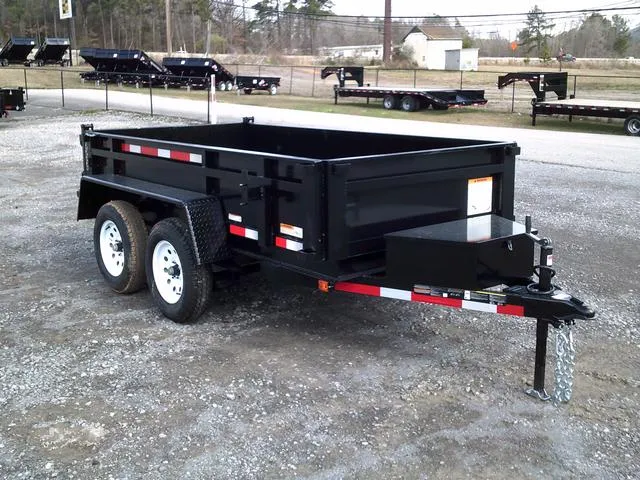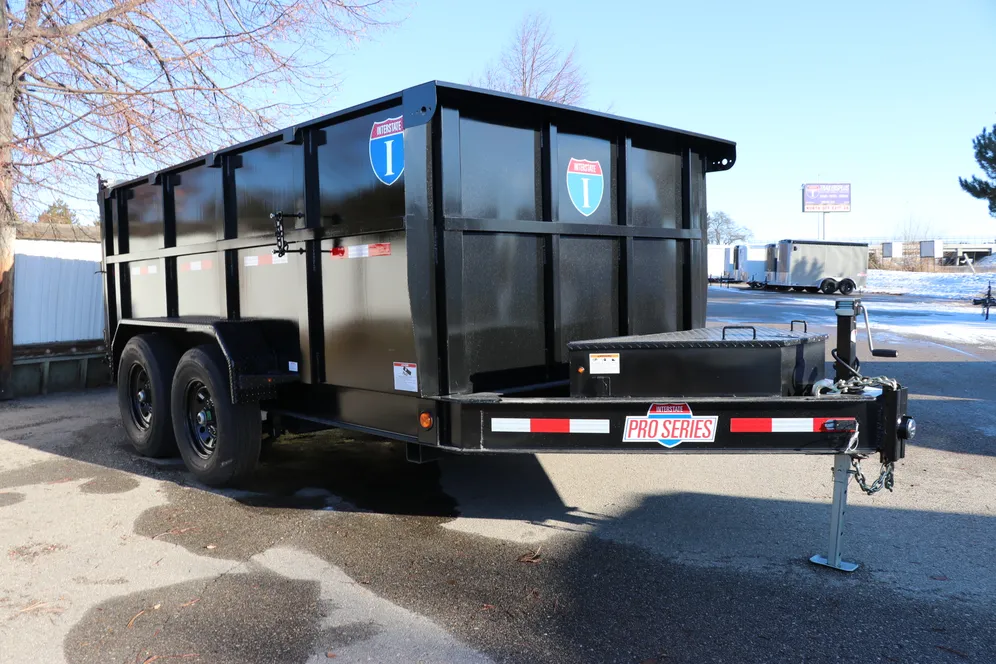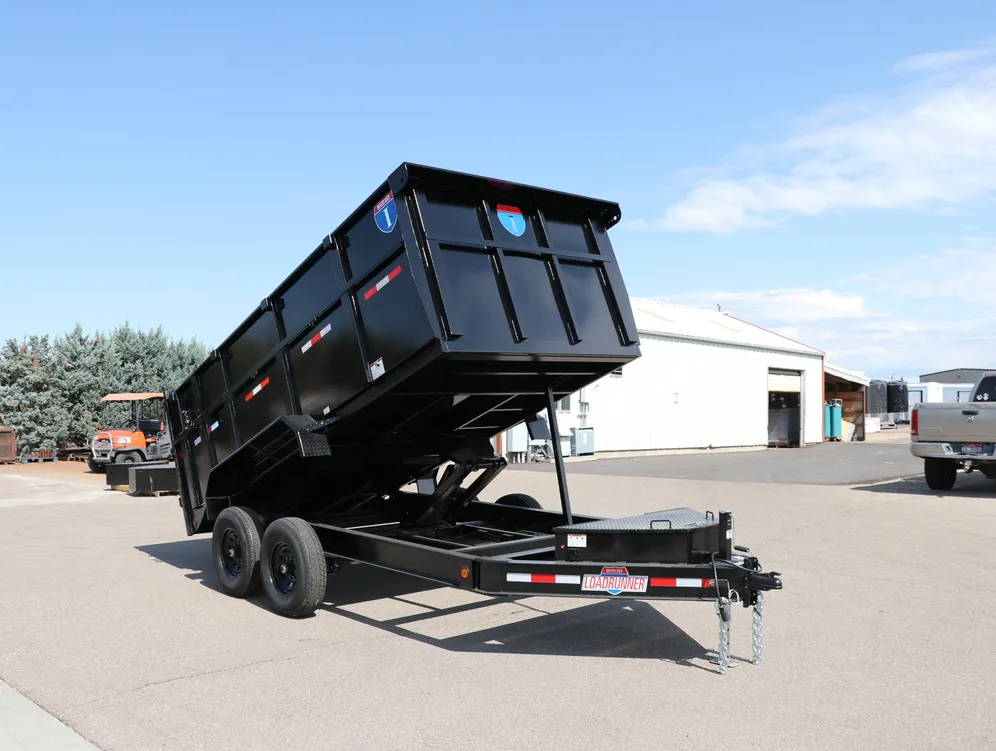Choosing a dump trailer isn’t just about picking a length and width—it’s about buying the right tool for how you work. A trailer that’s too small forces extra trips. One that’s overloaded will wear out prematurely or put you over legal weight limits. The right size trailer balances capacity, weight rating, and loading access so you can move materials efficiently, safely, and without delay. Whether you’re hauling construction debris, roofing scrap, landscaping material, or equipment, your trailer should support your daily workflow, not create bottlenecks. Before anything else, get clear on what you haul the most, how heavy those loads usually are, and whether you’re transporting machines along with material. That combination drives your size decision more than the trailer’s footprint ever will.
Smaller Dump Trailers: Right-Sized for Light-Duty Work
If your daily work revolves around small cleanups, yard waste, mulch deliveries, or light property maintenance, a 5x10 or 5x8 dump trailer can get the job done without being more trailer than you need. These trailers are easy to tow, store, and maneuver through tight residential areas—especially when backing into driveways or working on narrow streets. They’re ideal for landscapers, handymen, or homeowners managing small-scale renovations. Most models in this range are available with single or tandem axles, with weight ratings from 5,000 to 10,000 pounds. That gives you enough capacity for brush, mulch, shingles, or general debris without the added bulk or cost of a larger commercial unit. Keep in mind, though, the volume and weight add up fast. If your projects are getting bigger or more frequent, a trailer this size can become a limiting factor.

Mid-Size Dump Trailers: The Workhorse for Everyday Jobs
For most contractors, remodelers, and landscaping crews, a 6x10 or 6x12 dump trailer hits the sweet spot. These sizes are long enough for pallets, wide enough for general material, and rated high enough to handle regular use without being overkill. A 6x12 trailer with a 10K or 12K GVWR can comfortably handle tear-off debris, loose fill, and smaller machines like trenchers, compressors, or light skid steers. These trailers are compact enough to fit on residential jobsites but still built tough enough for commercial use. Most models offer ramps, tie-downs, and barn doors or combo gates for flexibility in loading and unloading. If your workload varies, this is where to start looking—it gives you space without being cumbersome.

Full-Size Trailers: Built for Heavy Material and Equipment
If you’re hauling full loads of rock, concrete, or equipment every week, it’s time to move into 7-foot-wide trailers with 14,000-pound ratings. These are the standard for serious construction crews, grading contractors, or anyone working with dense material or heavier machines. A 7x14 or 7x16 trailer can carry bulk loads without maxing out the axles, while giving you a longer bed for proper weight distribution. They’re also better suited for hauling machines like skid steers, mini-excavators, or ride-on trenchers. These trailers typically include reinforced gates, underbody ramp storage, welded D-rings, and multiple stake pockets. They’re built for daily commercial use—heavy hauling, rough terrain, and the kind of work that doesn’t slow down just because it’s raining.

Know Your Weight Requirements: GVWR and Equipment Readiness Go Hand-in-Hand
Two dump trailers might look identical in size, but if their GVWR ratings differ, so will their performance. The gross vehicle weight rating is determined by the axles, frame, and suspension—not the trailer’s dimensions. If you're regularly hauling more than 6,000 pounds, a 10K trailer may not be enough. A 12K or 14K model offers the structural strength and safety margin required for heavier loads.
This becomes even more important if you’re also hauling equipment like skid steers or trenchers. Not every dump trailer is built for that. Look for steel ramps rated for equipment weight, welded D-rings for proper tie-downs, and gates reinforced for machine loading. If your trailer handles both debris and machinery, size and rating should be based on the heavier use—not just the physical space you need.
Don’t Skip the Tarp: Why It’s More Than a Legal Requirement
If you’re hauling loose material in a dump trailer, using a tarp is more than just a good idea—it’s often required by law. Materials like gravel, dirt, or roofing scrap can easily fall out during transit, causing damage, obstructing roads, or creating a hazard for other drivers. Unlike enclosed trailers, dump trailers leave your load exposed, which makes a secure cover necessary on nearly every job.
State laws vary, but all drivers are responsible for ensuring nothing escapes the trailer during transport. Many states issue fines—and in some cases even jail time—for unsecured loads. To comply, TrailersPlus recommends installing a proper tarp system. If you don’t already have one, you can schedule a service appointment at your local TrailersPlus location to have a tarp installed. With over 80 locations across the U.S., we make it simple to stay compliant, protect your load, and avoid costly penalties.

Side Height: Low Profile or High Volume?
The height of your dump trailer’s side walls affects both capacity and accessibility. Low-profile models (around 24 inches tall) are easier to load by hand or with machines like pallet jacks and skid steers. They keep the center of gravity low and are better for mixed-use applications where you’re loading equipment as often as you’re dumping material.
High-side trailers (up to 48 inches or higher with extensions) are more useful when you're hauling loose bulk—things like brush, scrap wood, or roofing tear-off that’s high volume but not very dense. High sides reduce spillage and keep your payload contained. If your work varies, look for trailers that can accept removable side extensions to give you more flexibility without locking you into a single setup.
Think Ahead: Trailer Size Should Support Business Growth
One of the most common regrets we hear is buying too small. It makes sense to start conservatively, but if you're already filling your current trailer to the limit, it may be more cost-effective to step up a size now rather than buy again before your trailer’s warranty expires. A trailer that’s slightly bigger than what you need today gives you room to grow—whether that means taking on new clients, upgrading your equipment, or just reducing the number of trips per job. It also helps reduce wear on your truck and trailer over time, since you’re not always operating at maximum capacity. When in doubt, size up—but only if your tow vehicle can handle it.
Choose TrailersPlus - Let the Work Decide, Not the Price Tag
At TrailersPlus, we stock a wide range of dump trailer sizes—from 5x8 single axles to 7x16 tandem axles with 14K ratings and gooseneck models for commercial fleets. Every trailer we sell is built for long-term use, with commercial-grade materials, sealed hydraulic systems, and steel construction that holds up under tough jobsite conditions. If you’re not sure what size is right, visit your local TrailersPlus. We have helped hundreds of contractors find the right fit for their exact workload. We’ll help you think through not just what the trailer needs to do—but how it’ll hold up to the way you actually use it. Because the right size trailer doesn’t just move material—it keeps your schedule on track and your business moving forward.
Learn more about trailer financing!
Call Us Now 877-850-7587









